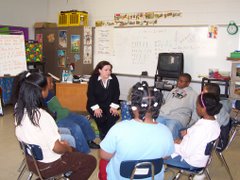The reason that I'm such an advocate of Socratic Seminars is because I strongly believe that engaging students through dialogue is a way to deepen understandings and develop effective communication skills. Recently, I've been reading about IC (Instructional Conversation) and I have become very interested in the instructional strategies associated with it.
Thinking, and the abilities to form, express, and exchange ideas are best taught through dialogue, through questioning and sharing ideas and knowledge. In the Instructional Conversation (IC), the teacher listens carefully, makes guesses about intended meaning, and adjusts responses to assist students’ efforts--just as in graduate seminars, or between mothers and toddlers. Here the teacher relates formal, school knowledge to the student's individual, family, and community knowledge. The IC provides opportunities for the development of the languages of instruction and subject matter. IC is a supportive and collaborative event that builds intersubjectivity and a sense of community. IC achieves individualization of instruction; is best practiced during joint productive activity; is an ideal setting for language development; and allows sensitive contextualization, and precise, stimulating cognitive challenge.
This concept may appear to be a paradox; instruction implies authority and planning, while conversation implies equality and responsiveness. But the instructional conversation is based on assumptions that are fundamentally different from those of traditional lessons. Teachers who use it, like parents in natural teaching, assume that the student has something to say beyond the known answers in the head of the adult. The adult listens carefully, makes guesses about the intended meaning, and adjusts responses to assist the student’s efforts - in other words, engages in conversation. Such conversation reveals the knowledge, skills, and values - the culture - of the learner, enabling the teacher to contextualize teaching to fit the learner’s experience base.
In U.S. schools the instructional conversation is rare. More often, teaching is through the recitation script, in which the teacher repeatedly assigns and assesses. Classrooms and schools are transformed into communities of learners through such dialogic teaching, and when teachers reduce the distance between themselves and their students by constructing lessons from common understanding of each others’ experience and ideas and make teaching a warm, interpersonal and collaborative activity.
Saturday, September 29, 2007
Subscribe to:
Post Comments (Atom)

No comments:
Post a Comment